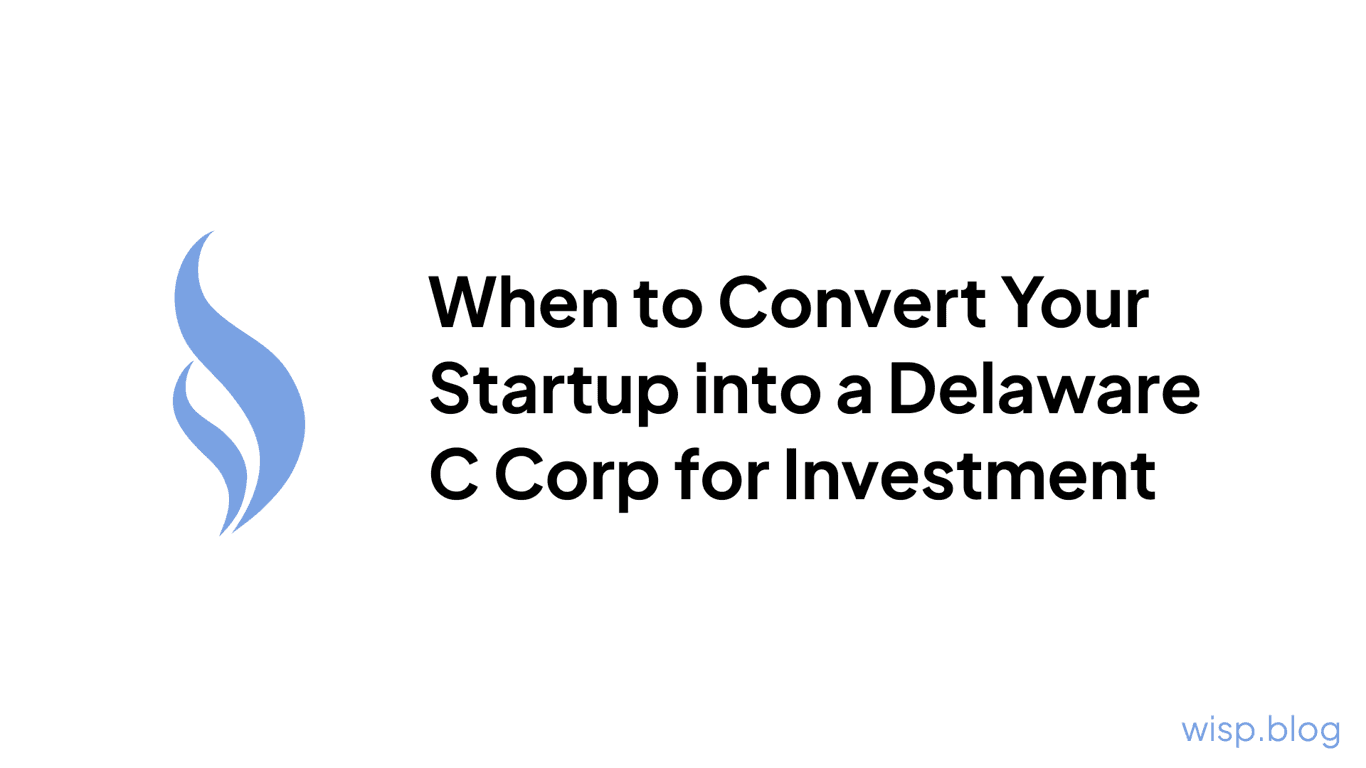
You're an aspiring entrepreneur with a brilliant business idea. You've done some research and heard that all the big startups incorporate as Delaware C corporations. Investors and accelerators seem to require it. So you rush to set one up through an online legal service, thinking you're checking the right boxes. But after spending hundreds or thousands in filing fees, you realize you don't actually have any clients or revenue yet. Now you're overwhelmed with having to deal with payroll, annual fees, tax filing requirements and more - all for a non-existent business. What was supposed to position you for success has become an expensive regret.
The startup world is full of jargon and conventional wisdom that can mislead overeager first-time founders. You've likely read all the glamorous stories of billion-dollar startups that started as humble Delaware C corps. Maybe you even have friends or family who insisted you had to incorporate that way from day one to be taken seriously by investors. So you followed that advice blindly, thinking it was a necessary first step.
But now reality has set in. You're stuck dealing with a complex corporate structure you don't fully understand. You have to pay legal fees, franchise taxes, registered agent costs, and accounting bills - all money you can't really afford to lose on a non-operating business. The burden of payroll, stock issuances, board meetings, and filing corporate tax returns is daunting when you haven't made a single sale yet. You're paralyzed by all this bureaucracy instead of focusing on actually building your product or service.
What if blindly setting up a Delaware C corp as a first-time founder is usually an unnecessary costly mistake?
The truth is, investors don't expect you to be incorporated when you're still just an idea. In fact, they generally prefer you keep things simple with an LLC or even just a sole proprietorship in the early stages. Incorporating as a C corp is a very specific legal decision with major implications - it's not just a box to check off without understanding the ramifications.
Here are some tips for avoiding the Delaware C corp trap as a new founder:
Stay Simple Early On
When you're still just validating your idea and building an MVP, keep your business structure basic as a sole proprietor or LLC. This avoids unnecessary legal and tax complexities so you can focus on what matters.
As a sole proprietor, you can simply operate under your own name and social security number. File a DBA ("Doing Business As") for branding purposes if needed. For an LLC, use an affordable online service like Northwest Registered Agent to incorporate in your home state.
The benefits of keeping things simple upfront are huge. You avoid having to deal with corporate formalities like annual meetings, board appointments, stock issuances and so on. Your personal taxes remain simple as pass-through income. And if your business ultimately fails to get traction, you can simply walk away without dealing with a formal dissolution process.
Common Pitfall: Getting spooked by the "unlimited personal liability" myth of sole props and LLCs. In reality, following best practices like getting insurance and keeping corporate veil requirements mitigates most risks.
Pro Tip: Open a separate business bank account and credit card right away, even as a sole prop. It makes accounting and building business credit easier from day one.
Understand Why Investors Want C Corps
The main reasons VCs prefer C corps is for legal advantages around different stock classes, governance controls, and pass-through taxation issues. But these only become relevant once you've built something viable and are raising institutional funding.
With a C corp, you can issue different classes of stock like common shares for founders/employees and preferred shares for investors. This allows investors to get liquidation preferences, anti-dilution protections, and other controls. C corps also have formal board governance that gives investors board seats.
Additionally, VCs are typically partnerships or funds that can't receive pass-through income from vehicles like LLCs or S corps due to their structures. C corp equity avoids this tax headache.
But until you have a product being used by real customers, a pipeline of leads/revenue, and are raising an institutional seed round, you don't need these complexities.
Common Pitfall: Thinking you need a C corp just because you plan on raising venture capital at some point down the road. That's putting the cart before the horse.
Pro Tip: Read resources like Brad Feld's "Venture Deals" to understand the VC mindset and why C corps are preferred once the time is right.
Wait for Incorporation Guidance
If you get into a respected accelerator program like Y Combinator, they'll actually guide you through properly incorporating as a C corp at the right time. Don't jump the gun prematurely.
The best accelerators have a vested interest in setting you up with the right corporate structure and funding instruments. For example, Y Combinator provides founders with a free, pre-negotiated incorporation package through Clerky when they're ready to incorporate in Delaware.
They also have relationships with GUST and Stripe Atlas to streamline the setup process. And their network of lawyers and tax experts can ensure you incorporate correctly.
Common Pitfall: Rushing to incorporate as a C corp just because you think it will impress investors or accelerators. They'd much rather see traction first.
Pro Tip: During your accelerator program, take meticulous notes on all the advice and guidance around incorporation, funding, cap tables, and so on. It's a masterclass in itself.
Use Tools Built for Founders
Services like Stripe Atlas, Clerky, and Gust Launch allow you to incorporate simply and affordably when the time is right. They're built specifically for startups, not general online legal services.
Stripe Atlas is an all-in-one platform that helps you incorporate a new or existing company as a Delaware C corp. It sets up your corporate docs, cap table, federal EIN, cloud tools, and even a banking account - all for $500.
Clerky and Gust Launch offer similar services providing affordable incorporation packages tailored for seed/venture rounds. They have integrations with cap table tools, e-signature, and other startup-friendly features.
Common Pitfall: Using general online legal services that provide a subpar incorporation experience not built for the needs of startups.
Pro Tip: Even with startup-friendly services, you'll likely still want to consult a startup attorney to review all your incorporation docs and counsel you on best practices.
Get Advice from Experienced Mentors
Seek out successful founders, investors, and startup attorneys in your local ecosystem. They can provide context on incorporation timing and structure based on your specific situation.
Every startup journey is different, so advice from mentors who have been through it before is invaluable. They can share firsthand lessons on what they'd do differently regarding incorporation.
Look for mentors via your local startup community, accelerator programs, angel groups, law firm partners, and more. Ask specific questions about their incorporation experience and process. What were the key considerations and inflection points for them?
Common Pitfall: Taking incorporation advice solely from blogs, books or inexperienced peers who have never actually started a successful venture-backed company.
Pro Tip: Once you have a roster of mentors, be sure to "mentor date" by continuing the relationship. Their guidance will be invaluable through every stage.
The bottom line is, as a new founder, you should be laser-focused on finding product-market fit and building something people actually want. Incorporating too soon as a C corp creates legal and financial overhead that distracts from what's most important. So avoid that common pitfall - keep it simple until you have a validated business that's ready for the big leagues.
Starting a company is hard enough without creating unnecessary burdens for yourself from the start. By avoiding the Delaware C corp trap and keeping your business structure simple early on, you'll be able to channel all your energy into the things that really matter: building an amazing product, acquiring customers, and finding a repeatable revenue model. Once you've achieved those key milestones, then you can revisit the incorporation question from a position of strength - not one of regret and overwhelm. Stay focused, stay lean, and don't let the conventional wisdom of startup jargon lead you astray.


